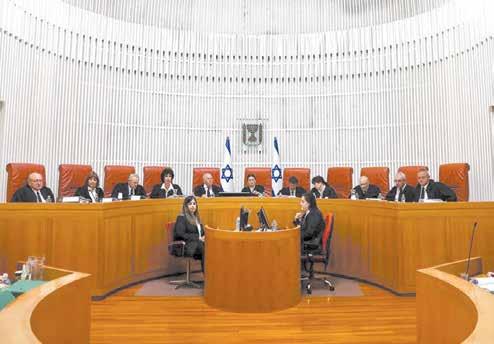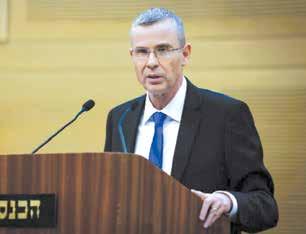
11 minute read
What Israel’s Judicial Crisis is Really About by Shammai Siskind
The Jewish Home | JANUARY 19, 2023
What Israel’s Judicial Crisis is Really About
By Shammai SiSkind
Thus read a New York Times editorial published shortly after the current government was elected.
There have been plenty of attacks from around the globe aimed at the new government in Israel and especially its proposed judiciary reforms. What concerns this article is not opinions from the rest of the world but rather the internal controversy within Israeli society.
There have been few issues in Israeli politics outside of national security that have been the basis of such intense debate over so many years. Only subjects that go to the heart of national identity and the foundations of the state apparatus qualify for such slots. And indeed, the debate over the role of the judiciary is such a subject. As we will see, the opinions on either side of this issue represent dramatically different views on not just the ideal power of the courts but of the very role of government itself.
The Backdrop: A Brief History of an Activist Court
In the 1980s, Israel began the path of what is today recognized as the judicial revolution. The main proponents of this revolution were Justices Meir Shamgar, then president of the Supreme Court, and Justice Aharon Barak, later to replace Shamgar and destined to become the main advocate of increasing judiciary power in Israel.
There were several important milestones to this process. First was the abolishment of the restriction of standing. Typically, a court can only be petitioned by a party directly affected by the legal issue at hand. The doing away with standing restrictions allowed anyone – even if they weren’t an Israeli citizen – the ability to submit a case for review.
Second, the court abolished the restriction of justiciability. This was perhaps the most impactful change of all since it essentially allowed for any governmental issue from foreign affairs to budgetary issues, even national defense, to be controlled by the court’s opinion.
Third on the timeline was vastly widening the basis on which the court was permitted to make decisions. The court would be allowed to evaluate not just the legality but also the “reasonability” of government decisions. If deemed by justices as “extremely unreasonable,” the court could overturn, in theory, any government action. As Barak put it, judges played the role of “the enlightened community” that must assess everything and anything to ensure it does not deviate from the proper path.
Another technical but important change to judicial procedure came in 1993 when the court ruled that the opinions rendered by the state’s attorney general were no longer to be considered merely legal advice but were binding on the government and all of its agencies and that only the state attorney could represent the executive in any legal argument. What this meant practically is that if the state attorney had a differing view on a legal issue than the government, there could be no one to defend the government’s position. This might sound bizarre, but it is exactly what took place in 2003 when former Prime Minister Ehud Olmert, then Minister of Industry, was faced with a Supreme Court case regarding a land rezoning effort. The state attorney agreed with the case’s petitioner that the deal failed to achieve

“distributive justice” and thus refused to represent the government in court. But Olmert was stuck. Only the state attorney was legally allowed to argue the case. Even Olmert’s insistence that he would represent himself was dismissed.
The final milestone came in 1995, the year Barak took formal control of the Court. In what is certainly his most overarchingly influential decision, Barak, along with his fellow justices, established that Israel’s Basic Laws that had been passed three years prior had the status of Israel’s constitution. This claim has no legal basis whatsoever. No MK voting on the laws ever believed the Basic Laws were anything different than other pieces of legislation. As the laws were being passed, the chairman of the Knesset committee that prepared them explicitly assured his fellow MKs that they did not grant the court “special power to nullify laws.” To this day, the Basic Laws could be in theory altered by a simple majority –hardly the status of a constitution.
Strategically, however, declaring the Basic Laws the Israeli constitution was extremely important. It granted the court a basis of legitimacy on which it could invalidate future laws. This has not remained a theoretical possibility. The court’s intervention in all areas of Israeli governance has come up time and time again, even in the most sensitive of cases – that of national security.
An early example involved the capture of Israeli pilot Ron Arad in 1986. Arad crashed in Lebanon and was taken captive by the militia group known as Amal. Later, Mustafa Dirani, the militia’s leader, gave Arad to a senior Hezbollah commander named Abd al-Karim Obeid, shortly after which Israeli intelligence lost the trail of the missing pilot. In a secret operation, Israel captured both Dirani and Obeid in order to extract information from them on Arad’s whereabouts and to hold them until Arad’s return. The two men petitioned Israel’s Supreme Court, claiming they were being held unjustly. The court shockingly ordered them freed, the logic being that neither posed a direct threat to Israel and that they were being merely kept as “hostages.”
With time, the use of judicial review to undermine the country’s security and support Israel’s sworn enemies became even more pronounced. Barak, now firmly the face of judicial activism, made his positions clear. In an article written in the early 2000s for Harvard Law Review, Barak stated that the court was obligated to vigilantly oversee all government issues related to security and national defense. He endorses an “open door,” “real time” policy for the courts to hear issues on security operations because “there are no black holes where there is judicial review,” or in other words, the court cannot allow the government to handle its own affairs unsupervised and must be under the constant supervision of the justices.
Under Barak’s leadership, the court heard hundreds of petitions on these very issues: due-process rights for terror suspects, interrogations, use of human shields, house demolitions, the route of the security barrier, compensation for wrongful acts of the army. Even more unsettling was the court hearing cases regarding ongoing military operations.
This was the scenario that unfolded in 2002 during the case, “Almadani v. IDF Commander in Judea and Samaria.” The governor of Bethlehem and two Israeli Arab Members of Knesset had petitioned the Court demanding that the IDF provide food and electricity to a group of Palestinians, including dozens of militants, many of whom had been identified as the culprits in specific acts of terrorism, who had barricaded themselves inside the Church of the Nativity. Despite the army’s insistence that the IDF was in the midst
of negotiating these very issues with the terrorists, the court declined to dismiss the case on grounds of non-justiciability and considered it on the merits. Barak justified taking the case in “real time” on the basis of strengthening the “rule of law” and “human rights.”
Getting at the
Justice Minister Yariv Levin hopes to insitute reforms Former Justice Aharon Barak, the face of the activist Principlesjudicial system Current Justice Minister Yariv Levin has emerged as the reformist “foil” to the activist Barak. Shortly after taking up his role, Levin laid out the main points which the proposed reforms touch on. Both of them are directly addressing the trend of judicial activism and expansion that has characterized the Court for the past 20 years. First is the issue of limiting the court’s judicial review regarding laws. If 61 out of the 120 members of Israel’s parliament agree, the body can override the Supreme Court. One caveat is that if the court unanimously nullifies a law, the same parliament that passed the law cannot override it. Furthermore, 12 out of 15 justices will be required to invalidate a law to begin with. If these reports are correct, then the new arTo grasp the rangement will somewhat resemble the American checks and balances system in which the president fundamental argument can veto a law, which can, in turn, be overridden by a two-thirds congressional majority. Second is changing the system by which judges between Levin and are appointed. Currently, a nine-member committee votes on replacement justices. There is one important Barak, one must ignore rule, however, in how this vote takes place: three of the committee members, namely three members of the Suthe flying accusations preme Court, including the president, have veto power over an appointment. This has essentially assured that there is an ideological continuity to the court that canback and forth between not be altered by elected officials. The reforms would see the committee expanded to an 11-member body, the two that the other is with the two additional members being “public representatives” chosen by the government. This means “destroying democracy.” that the majority of the committee would be controlled by elected officials. But it is very important to go beyond the specifics of the reforms and understand the ideological basis that undergirds the entire conversion. To grasp the fundamental argument between Levin and Barak, one must ignore the flying accusations back and forth between the two that the other is “destroying democracy.” Levin and Barak have two radically different understandings of what democracy is supposed to look like –and, more specifically, what the role of the judiciary is in preserving it. One sees the Court as the referee for established rules, rules that are an organic expression of voters’ political will. The other sees it as a collection of proverbial “wise old men” ensuring that the uncouth and untrustworthy elected officials do not

72 veer off the enlightened path. In the first version, the Court, while absolutely essential, is in the end playing a tertiary role, providing guardrails lest officials and The Jewish Home | JANUARY 19, 2023 executives deviate from their own rules. In the latter, the Court is the ultimate guiding light, charged with correcting the unenlightened mistakes of every facet of government. But in a way, even this divergence is insufficient in framing the debate. The two sides are not just arguing on the ideal structure and powers of government branches. They are debating on the very purpose of government institutions themselves. To put it as bluntly as possible: Levin and reform advocates believe the purpose of government is to maintain ordered liberty. That is a very specific and very limited job description. Ahron Barak and those of his ilk believe that the purpose of government is to ensure the populace remains moral. This was most depicted by a striking statement made by Barak in 2018 warning that any limits on judicial power was opening the door to atrocity. At the time, then-Justice Minister Ayelet Shaked had introduced a bill to change the procedure by which ministry legal advisers – people with substantial influence over determining the legality of their ministries’ actions – are nominated and appointed. Barak became a staunch opponent of the proposed law, accusing the government of wanting to minimize the influence of judicial gatekeepers. At the height of the public debate over the bill, Barak has this to say regarding Shaked’s proposal: “We
the issue is that it cannot happen here, and it is wrong. If it happened in Germany during the times of Bach, Goethe, and Beethoven, it could happen anywhere.”
These thinly veiled comments by Barak dovetailed a similar statement he had made only three years prior while, once again, warning against any limits on the court’s power: “I believe with a perfect faith that if Germany had a strong Supreme Court and judicial oversight it would have been possible to prevent Hitler.”
Strong words. Now consider their implications: If you actually believe this, namely that all that is standing between civilization and the descent to the depths of depravity is a strong Supreme Court, then, of course, you will see any limitations on the Court’s power as an existential threat.
But as a matter of fact, prewar Germany had a very strong supreme court, granted by the Weimar Constitution the power to invalidate laws (Article 13) and hear impeachment cases against the President of the Reich (Article 59). And yet, strangely, Germany still produced a Hitler and a conflagration that consumed much of the developed world.
This very fact highlights the entire point of reform proponents. Judicial activists in Germany ignored the accesses of the 1930s and used interpretive acrobatics to let the madness continue and even allow Hitler, a convicted coup instigator, to rise to power.
No, a “strong court” will not guarantee the righteousness of a society. No system will. In fact, the very belief that any system can deliver on this leads to the very overreach we have seen over the decades.
The absurdities of legal activism have been ongoing for far too long in Israel. The judiciary has become the very oligarchy it has purported to be the bulwark against. Putting an end to this excess is far overdue.












